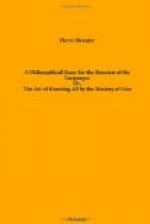The veneration that I have alwayes had for antiquity, made me think at first of ingaging for the Hebrew, as being (for ought we know) the earliest, the most noble, and most naturall Language of the world and that from which all others, in a manner, derive themselves. But it was not long before I began to consider, that this would directly crosse the first principles of my intended method, and appear a kind of indeavour to teach an unknown Language, by another, of which we have the most imperfect, and slender information of all. The kindnesse, and inclination I ought to have for my own Country, had almost perswaded me to rest my self there, and to make my native tongue the basis of this universall reduction but then the rest of the Europaean world (which I have no reason to slur or contemne) would have as ill resented the project, as we did it in the Germans, who would long agoe have challenged this honour to themselves. I had in the end no other course to take, but to throw myselfe upon the Latine, in which I luckily met with all the necessary conditions that did easily, and plausibly conduce to my design’d attempt.
To say the truth Aristotle himselfe, a man of a judgement in such things the most exact that ever was to take a measure from, demanded but three qualifications, viz. Universality, Certainty, and Proportion; that it should be generally known to all those that are to make use of it in the quality of a measure, that it should be fixt, and determin’d in its selfe, and then that it should be proportion’d to all those things, to which it prescribes their bounds, all which characters do with advantage combine in the Latine, and that with such propriety that they cannot be attributed to any other without some sort of injustice; for the greatest part of the other Languages they are determind to the extent of a particular Kingdom or Country, the Latine hath no such disadvantage upon it. It is to speak properly the Language of Europe: Religion, and the Sciences have more enlarg’d its dominions, then all the conquests of the Romans; tis almost the common Idiom of the North, and universally knowne to persons of birth and education, who alone are presum’d to stand in need of the assistance of forraigne Languages.
It disownes the common imperfection of others, which by nature being subject to change, cannot by consequence, serve for a certain determinate rule in all ages; and if it now survive through the large extent of its entertainment, it hath much the advantage of others, that are in a manner deceas’d to this that is fixt, and retaind by a well assur’d custome and if its being universally known allows all persons to share its uses, so its being steddy, and unalterable, secures it from all the uneven changes of time.




